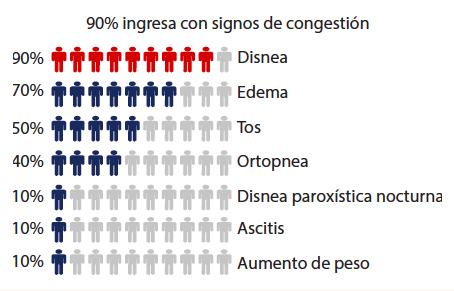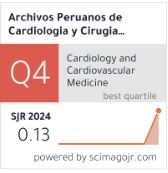Resistencia diurética e insuficiencia cardiaca: entre la congestión y la disfunción renal
DOI:
https://doi.org/10.47487/apcyccv.v1i3.72Palabras clave:
insuficiencia cardiaca, diuréticos, síndrome cardiorenal, resistencia a los diuréticos, congestiónResumen
La Insuficiencia Cardiaca (IC), uno de los principales contribuyentes de la mortalidad cardiovascular en la actualidad, nos enfrenta a grandes retos. La interacción riñón corazón tiene particular atención por el desarrollo del denominado síndrome cardiorenal (SCR) y con este, la resistencia a los diuréticos (RD), predictor de eventos adversos en IC aguda independiente de la tasa de filtrado glomerular (TFG). Su desarrollo es secundario a múltiples causas, por lo que se requiere una evaluación integral de todas ellos. En los últimos años ha tomado relevancia la congestión dentro del mecanismo fisiopatológico del SCR, por generar y perpetuar mutuamente el daño en estos dos órganos. Ante la importancia de la congestión, los diuréticos se mantienen como clave para el tratamiento, aunque su empleo ampliamente es empírico por la escasa evidencia disponible. El paradigma del tratamiento basado en evidencia, es esquivo en este escenario, por lo que una pregunta permanece sin respuesta ¿intervenciones para tratar la RD o para prevenirla modifican el pronóstico en IC aguda?
Descargas
Referencias
Ponikowski P, Voors AA, Anker SD, et al. 2016 ESC Guidelines for the diagnosis and treatment of acute and chronic heart failure. Eur Heart J. 2016;37(27):2129–200.
Mullens W, Abrahams Z, Francis GS, et al. Importance of Venous Congestion for Worsening of Renal Function in Advanced Decompensated Heart Failure. J Am Coll Cardiol [Internet]. 2009;53(7):589–96. Available from: http://dx.doi.org/10.1016/j.jacc.2008.05.068
Lala A, McNulty SE, Mentz RJ, et al. Relief and recurrence of congestion during and after hospitalization for acute heart failure insights from diuretic optimization strategy evaluation in acute decompensated heart failure (DOSE-AHF) and cardiorenal rescue study in acute decompensated heart . Circ Hear Fail. 2015;8(4):741–8.
Wattad M, Darawsha W, Solomonica A, et al. Interaction between worsening renal function and persistent congestion in acute decompensated heart failure. Am J Cardiol. 2015;115(7):932–7.
Chioncel O, Mebazaa A, Harjola VP, et al. Clinical phenotypes and outcome of patients hospitalized for acute heart failure: the ESC Heart Failure Long-Term Registry. Eur J Heart Fail. 2017;19(10):1242–54.
Testani JM, Chen J, McCauley BD, et al. Potential effects of aggressive decongestion during the treatment of decompensated heart failure on renal function and survival. Circulation. 2010;122(3):265–72.
Metra M, Davison B, Bettari L, et al. Is worsening renal function an ominous prognostic sign in patients with acute heart failure? The role of congestion and its interaction with renal function. Circ Hear Fail. 2012;5(1):54–62.
Valente MAE, Voors AA, Damman K, et al. Diuretic response in acute heart failure : clinical characteristics and prognostic significance. Eur Heart J. 2014;35(19):1284–93.
Voors AA, Davison BA, Teerlink JR, et al. Diuretic response in patients with acute decompensated heart failure : characteristics and clinical outcome — an analysis from RELAX-AHF. Eur J Heart Fail. 2014;11(16):230–40.
Maaten J Ter, Dunning A, Valente MAE, et al. Diuretic response in acute heart failure: An analysis from ASCEND-HF. J Am Coll Cardiol. 2015;65(10):A1020.
Testani JM, Brisco MA, Turner JM, et al. Loop Diuretic Efficiency: A Metric of Diuretic Responsiveness with Prognostic Importance in Acute Decompensated Heart Failure. Circ Hear Fail. 2014;7(2):261–70.
Aronson D, Burger AJ. Diuretic Response: Clinical and Hemodynamic Predictors and Relation to Clinical Outcome. J Card Fail. 2016;22(3):193–200.
Kociol RD, McNulty SE, Hernandez AF, et al. Markers of decongestion, dyspnea relief, and clinical outcomes among patients hospitalized with acute heart failure. Circ Hear Fail. 2013;6(2):240–5.
Ambrosy AP, Cerbin LP, Armstrong PW, et al. Body Weight Change During and After Hospitalization for Acute Heart Failure: Patient Characteristics, Markers of Congestion, and Outcomes: Findings From the ASCEND-HF Trial. JACC Hear Fail. 2017;5(1):1–13.
H. Verbrugge F, Dupont M, B. Bertrand P, et al. Determinants and impact of the natriuretic response to diuretic therapy in heart failure with reduced ejection fraction and volume overload. Acta Cardiol. 2015;70(3):265–73.
Damman K, Ter Maaten JM, Coster JE, et al. Clinical importance of urinary sodium excretion in acute heart failure. Eur J Heart Fail. 2020;1–10.
Singh D, Shrestha K, Testani JM, et al. Insufficient natriuretic response to continuous intravenous furosemide is associated with poor long-term outcomes in acute decompensated heart failure. Jounal Card Fail. 2014;20(6):392–9.
Kumar D, Bagarhatta R. Fractional Excretion of Sodium and Its Association with Prognosis of Decompensated Heart Failure Patients. Jpurnal Clin Diagnostic Res. 2015;9(4):OC01–OC03.
ter Maaten JM, Rao VS, Hanberg JS, et al. Renal tubular resistance is the primary driver for loop diuretic resistance in acute heart failure. Eur J Heart Fail. 2017;19(8):1014–22.
Iqbal J, Javaid MM. Diuretic resistance and its management. Br J Hosp Med. 2014;75(7):103–7.
Cox ZL, Lenihan DJ. Loop Diuretic Resistance in Heart Failure : Resistance Etiology - Based Strategies to Restoring Diuretic Efficacy. J Card Fail [Internet]. 2014;20(8):611–22. Available from: http://dx.doi.org/10.1016/j.cardfail.2014.05.007
Ellison DH. Diuretic Therapy and Resistance in Congestive Heart Failure. Cardiology. 2002;96(3–4):132–43.
Ter Maaten JM, Valente MAE, Damman K, et al. Diuretic response in acute heart failure - Pathophysiology, evaluation, and therapy. Nat Rev Cardiol [Internet]. 2015;12(3):184–92. Available from: http://dx.doi.org/10.1038/nrcardio.2014.215
Fonarow GC. The Acute Decompensated Heart Failure National Registry (ADHERETM): Opportunities to improve care of patients hospitalized with acute decompensated heart failure. Rev Cardiovasc Med. 2003;4(SUPPL. 7):21–30.
Neuberg GW, Miller AB, O’Connor CM, et al. Diuretic resistance predicts mortality in patients with advanced heart failure. Am Heart J. 2002;144(1):31–8.
Ellison DH, Felker GM. Diuretic Treatment in Heart Failure. N Engl J Med. 2017;377(20):1964–75.
Felker GM, Lee KL, Bull DA, et al. Diuretic Strategies in Patients with Acute Decompensated Heart Failure. N Engl J Med. 2011;364(9):797–805.
Dikshit K, Vyden JK, Forrester JS, et al. Renal and extrarenal hemodynamic effects of furosemide in congestive heart failure after acute myocardial infarction. N Engl J Med. 1973;288(21):1087–90.
Chan JSK, Kot TKM, NG M, et al. Continuous Infusion Versus Intermittent Boluses of Furosemide in Acute Heart Failure: A Systematic Review and Meta-Analysis. J Card Fail. 2019;1.
Packer M, O’Connor C, McMurray JJV, et al. Effect of ularitide on cardiovascular mortality in acute heart failure. N Engl J Med. 2017;376(20):1956–64.
Bleske BE, Clark MM, Wu AH, et al. The effect of continuous infusion loop diuretics in patients with acute decompensated heart failure with hypoalbuminemia. J Cardiovasc Pharmacol Ther. 2013;18(4):334–7.
Gandhi S, Mosleh W, Myers RBH. Hypertonic saline with furosemide for the treatment of acute congestive heart failure: A systematic review and meta-analysis. Int J Cardiol [Internet]. 2014;173(2):139–45. Available from: http://dx.doi.org/10.1016/j.ijcard.2014.03.020
Griffin M, Soufer A, Goljo E, et al. Real World Use of Hypertonic Saline in Refractory Acute Decompensated Heart Failure: A U.S. Center’s Experience. JACC Hear Fail. 2020;8(3):199–208.
Cox ZL, Hung R, Lenihan DJ, et al. Diuretic Strategies for Loop Diuretic Resistance in Acute Heart Failure: The 3T Trial. JACC Hear Fail. 2020;8(3):157–68.
Brisco-Bacik MA, Ter Maaten JM, Houser SR, et al. Outcomes associated with a strategy of adjuvant metolazone or high-dose loop diuretics in acute decompensated heart failure: A propensity analysis. J Am Heart Assoc. 2018;7(18).
Adams KF, Fonarow GC, Emerman CL, et al. Characteristics and outcomes of patients hospitalized for heart failure in the United States: Rationale, design, and preliminary observations from the first 100,000 cases in the Acute Decompensated Heart Failure National Registry (ADHERE). Am Heart J. 2005;149(2):209–16.
Palazzuoli A, Testani JM, Ruocco G, et al. Different diuretic dose and response in acute decompensated heart failure : Clinical characteristics and prognostic signi fi cance. Int J Cardiol [Internet]. 2016;224:213–9. Available from: http://dx.doi.org/10.1016/j.ijcard.2016.09.005
Damman K, Valente MAE, Voors AA, et al. Renal impairment, worsening renal function, and outcome in patients with heart failure: An updated meta-analysis. Eur Heart J. 2014;35(7):455–69.
Metra M, Cotter G, Senger S, et al. Prognostic Significance of Creatinine Increases During an Acute Heart Failure Admission in Patients With and Without Residual Congestion: A Post Hoc Analysis of the PROTECT Data. Circ Heart Fail. 2018;11(5):e004644.


















